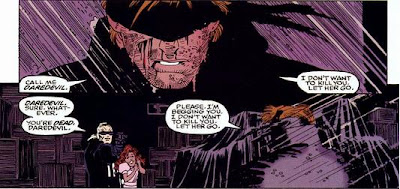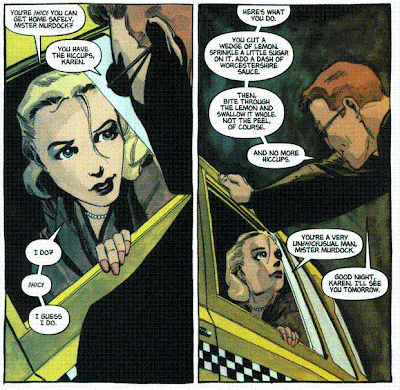
The above image is taken from the last part of "Daredevil: The Man Without Fear", a book that every true Daredevil fan should have in his/her collection. This book, in my opinion, truly proves that Frank Miller has been the best Daredevil writer of all time. I will surely return to this miniseries in another entry with a more complete analysis. For now I'll just content with a comment on a breathtaking scene of this book, which incidentally features a fantastic feat by our sightless crusader.
This one feat will probably make some realism-purists turn their nose up, but it's still a good one. And by the way, who said that everything in a comic book should be realistic?
Oh, also, since this is arguably the climatic scene of the whole miniseries, and I'd really hate to spoil it for those who haven't read it, if you still haven't read Miller's "The Man Without Fear" (which you should) and don't want to be spoilered, don't read below the line.
Along with dozens of other children, a little girl friend of Matt, Mickey, is being held captive by a group of children enslavers employed and controlled by the Kingpin. Leading them is Larks, Kingpin's right-hand man.
Larks is a fearsome killer. A ruthless assassin to whom killing is - as described by the writer's voice-over - "as natural as breathing".
Matt breaks into the enslavers' hideout, decided to put an end to their business once and for all. He causes a massive explosion and takes out hordes of thugs armed to the teeth. Sensing that the situation has gotten irreversibly f***ed up, Larks decides to exit the stage, but he takes Mickey with him. His first mistake.

- He's going to stop you! He's going to get you!
- Shut up.
- Matt's got magic powers! I saw!
Oh, we know, little girl. Trust me, we know he does.
Regaining his bearings after the assault, Matt focuses his senses to track Mickey and her captor, but he inadvertantly runs into the police, drawn in there in numbers by all the ruckus he has created. In the space of a few rushing panels, he's ganged up by a dozen cops, handcuffed and thrown in the back of a squad car to be hauled away.

Oh, also, since this is arguably the climatic scene of the whole miniseries, and I'd really hate to spoil it for those who haven't read it, if you still haven't read Miller's "The Man Without Fear" (which you should) and don't want to be spoilered, don't read below the line.
__________________________________________________________
Along with dozens of other children, a little girl friend of Matt, Mickey, is being held captive by a group of children enslavers employed and controlled by the Kingpin. Leading them is Larks, Kingpin's right-hand man.
Larks is a fearsome killer. A ruthless assassin to whom killing is - as described by the writer's voice-over - "as natural as breathing".
Matt breaks into the enslavers' hideout, decided to put an end to their business once and for all. He causes a massive explosion and takes out hordes of thugs armed to the teeth. Sensing that the situation has gotten irreversibly f***ed up, Larks decides to exit the stage, but he takes Mickey with him. His first mistake.

- He's going to stop you! He's going to get you!
- Shut up.
- Matt's got magic powers! I saw!
Oh, we know, little girl. Trust me, we know he does.
Regaining his bearings after the assault, Matt focuses his senses to track Mickey and her captor, but he inadvertantly runs into the police, drawn in there in numbers by all the ruckus he has created. In the space of a few rushing panels, he's ganged up by a dozen cops, handcuffed and thrown in the back of a squad car to be hauled away.

He loses track of Mickey, but still, Mickey doesn't lose faith in him:

Uh, well, not exactly what I was thinking about with this post but sure, why not. After all, the car not starting is Matt's job (he had cut the wires before).
This anyway, delays Larks' escape only for a little bit, just for the time needed to stop a cab and put a bullet in between the unlucky driver's eyes.
Be it the incessantly pouring rain, the agitation of the moment or the creeping fear that, yes, he might well be hounded by a relentless devil with magic powers, Larks finds himself crashing his cab against a police car.
Quickly, he takes Mickey and goes hiding in a nearby abandoned warehouse.

As if in answer to Mickey's invocations, Matt has come. Standing by the door, he orders Larks to let the girl go.
Larks, it has been said, is one of the worst criminals around. Kingpin's trustee. A man for whom killing is like breathing. And, as he reminds aloud, he's the one with the gun. His opponent is simply a blindfolded fellow in a jumpsuit, armed with only a truncheon.

Yet, why it looks like it is he, the one who is afraid?
What's so scary about this man? Who is he? Why is he so adamant in stating that he doesn't want to kill him? Could he actually be capable of doing that?
Too many questions. And whenever confronted with that, people like Larks always go by the shortest answer: pulling the trigger.

He has just gotten a gunshot wound and is not even flinching (I love the sound effect of the silenced gun, in this particular sequence, btw). He calmly repeats his terms of negotiation.
Larks is probably not even listening to him, fear grows within him as he shoots again at that enigmatic nightmare ...
Larks is probably not even listening to him, fear grows within him as he shoots again at that enigmatic nightmare ...

...who swings the baton and deflects the bullet meant for his chest, sending it back to Larks' feet. Beads of cold sweat form on Larks' face. Just who the hell is he facing?

- Call me Daredevil.
"Daredevil". For the first time, in the origin story told here by Miller, Matt refers to himself as Daredevil. A great part of the entire miniseries revolves around what this nickname means to him. It is a memory from the past, of the time when he was teased and beaten by schoolyard bullies, a memory of humiliations, of repressed anger towards injustice.
Bullies teasing the bookworm, bullies blackmailing a has-been boxer, bullies taking advantage of a poor family of father and son. Bullies believing they can take everything they want because they have the muscles, because they have the money, because they have power, because they are "the guy who's got the gun". Larks shoots once more:
Bullies teasing the bookworm, bullies blackmailing a has-been boxer, bullies taking advantage of a poor family of father and son. Bullies believing they can take everything they want because they have the muscles, because they have the money, because they have power, because they are "the guy who's got the gun". Larks shoots once more:

...

And it's one time too much. Matt deflects the bullet again, the already damaged baton shatters, and the bullet is deviated again. This time it finds its mark right the middle of Larks' forehead. He drops to the ground, in a pool of blood. Mickey and the other children are saved, and an important branch of Kingpin's organization has been destroyed. The legend of Daredevil has just begun.
A final word on this centrific feat. I know it's really hard to justify by going with just the strict definition of Daredevil's powers and abilities. His radar substitutes his vision, but how can it - even combined with his other abilities, and possibly with the special training given to him by Stick - be so accurate to define the trajectory of a bullet, and isolate in his mind the right instant to swing for it not only to be hit, but also to be sent back and hit a precise spot? Impossible.
It's already difficult to believe that he can sense the gunner's finger moving to pull the trigger, or even his muscles tensing before doing it, but to say that knowing the instant the shot is fired is enough to do that is a whole bigger stretch.
We could nitpick it, sure. As much as we want.
Or we could simply be like Mickey in this story. Like a little girl believing that Matt, her hero, has magic powers. As someone said, magic doesn't need to be explained. And I believe that maybe there's some magic involved, whenever a page from a comic book can move and inspire us, the way these ones did to me.
A final word on this centrific feat. I know it's really hard to justify by going with just the strict definition of Daredevil's powers and abilities. His radar substitutes his vision, but how can it - even combined with his other abilities, and possibly with the special training given to him by Stick - be so accurate to define the trajectory of a bullet, and isolate in his mind the right instant to swing for it not only to be hit, but also to be sent back and hit a precise spot? Impossible.
It's already difficult to believe that he can sense the gunner's finger moving to pull the trigger, or even his muscles tensing before doing it, but to say that knowing the instant the shot is fired is enough to do that is a whole bigger stretch.
We could nitpick it, sure. As much as we want.
Or we could simply be like Mickey in this story. Like a little girl believing that Matt, her hero, has magic powers. As someone said, magic doesn't need to be explained. And I believe that maybe there's some magic involved, whenever a page from a comic book can move and inspire us, the way these ones did to me.





























